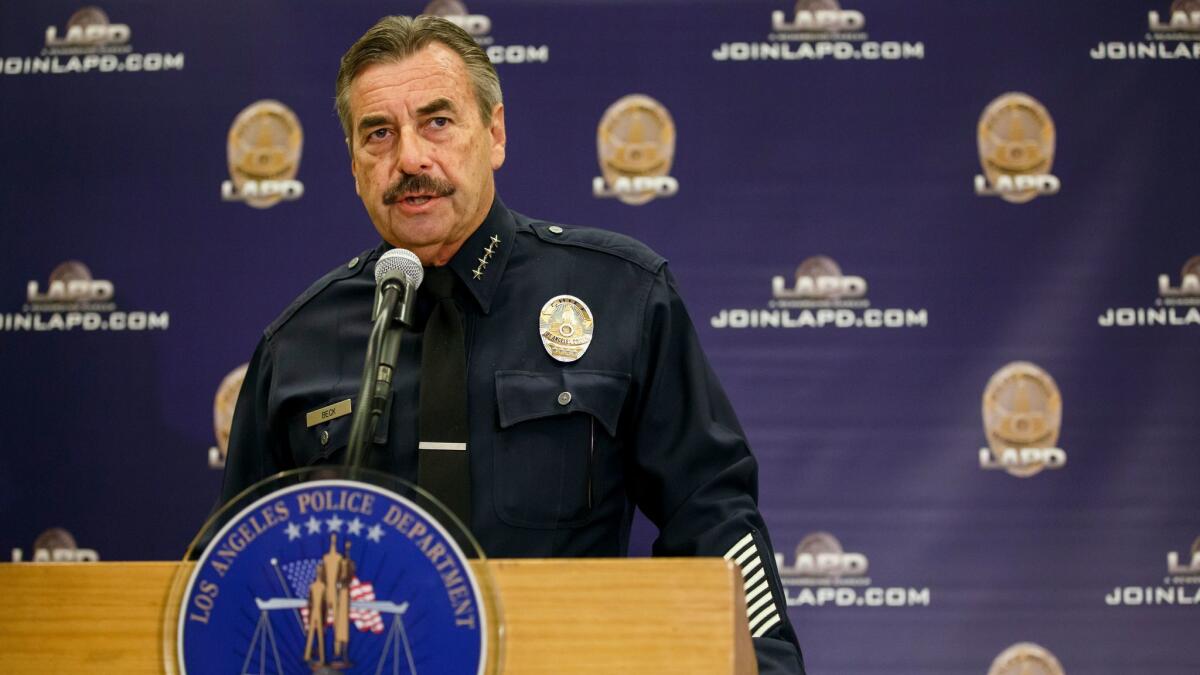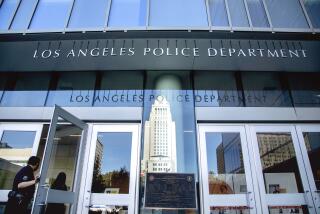LAPD union sues Chief Charlie Beck, city over complaint forms

Frustrated that the Los Angeles Police Department won’t warn people that knowingly filing false complaints against officers is against state law, the union representing the LAPD’s rank and file is taking the matter to court.
The Los Angeles Police Protective League sued the police chief and the city this week, demanding that the LAPD add such warnings to the forms people can fill out when alleging misconduct by officers.
The lawsuit, however, hinges on a hotly contested California statute that says making a purposefully false allegation against police is a misdemeanor. The law requires agencies to advise people of that potential crime when they make allegations against police.
The lawsuit calls on the court to determine the admonition is “legally valid, enforceable and must be implemented” by the LAPD and to stop the department from accepting complaints without the warning.
Police officers have long complained about what they perceive to be purposefully false accusations of misconduct, saying such reports are stressful and can stall their careers as they wait to be cleared by internal investigators. But police watchdogs and free speech advocates who have contested the law in court have also argued that such warnings could dissuade valid complaints against police.
“There’s an enormous chilling effect,” said Peter Eliasberg, an attorney with the American Civil Liberties Union of Southern California.
Dustin DeRollo, a spokesman for the Los Angeles Police Protective League, said the lawsuit is focused only on knowingly false complaints and does not seek to change “in any way” legitimate ones made against officers.
“False allegations, they hurt the careers and families of police officers. They hurt the officer’s reputation, they could prevent them from promoting or keep them out of the field where they could be out protecting residents,” DeRollo said. “They do have a substantial impact, and we’d like to see that curbed.”
“If you’re not purposefully lying about a police officer, you have nothing to worry about,” he added.
An LAPD spokesman declined to comment Thursday, saying the department had not yet seen the lawsuit.
The law prohibiting knowingly false allegations against police officers has been the subject of a legal back-and-forth dating back more than a decade.
In 2002, the California Supreme Court ruled that the law was constitutional, overturning a lower court’s decision that it violated the 1st Amendment by prohibiting knowingly false allegations of misconduct against police officers and no one else.
In 2005, the 9th Circuit Court of Appeals weighed in on a different case that originated in El Cajon. The court concluded that the law violated the 1st Amendment because it criminalized knowingly false speech that was critical of police but not knowingly false speech that supported officers.
“It’s the worst form of stacking the deck in favor of law enforcement,” said Eliasberg with the ACLU, which was involved in both cases.
The Los Angeles police union’s lawsuit contends that the 9th Circuit’s ruling was “incorrectly decided.” The lawsuit notes that the statute still exists in the state penal code.
“The admonishment has never been repealed,” said Richard Levine, who is representing the Police Protective League.
Despite the 9th Circuit’s decision, it cannot compel California’s Legislature to remove the law from the books, Eliasberg said.
“It’s really a shame the PPL wants to spend its time engaging in this kind of lawsuit,” Eliasberg said. “A federal appeals court has held that it’s an unconstitutional statute.”
Twitter: @katemather
More to Read
Start your day right
Sign up for Essential California for news, features and recommendations from the L.A. Times and beyond in your inbox six days a week.
You may occasionally receive promotional content from the Los Angeles Times.







